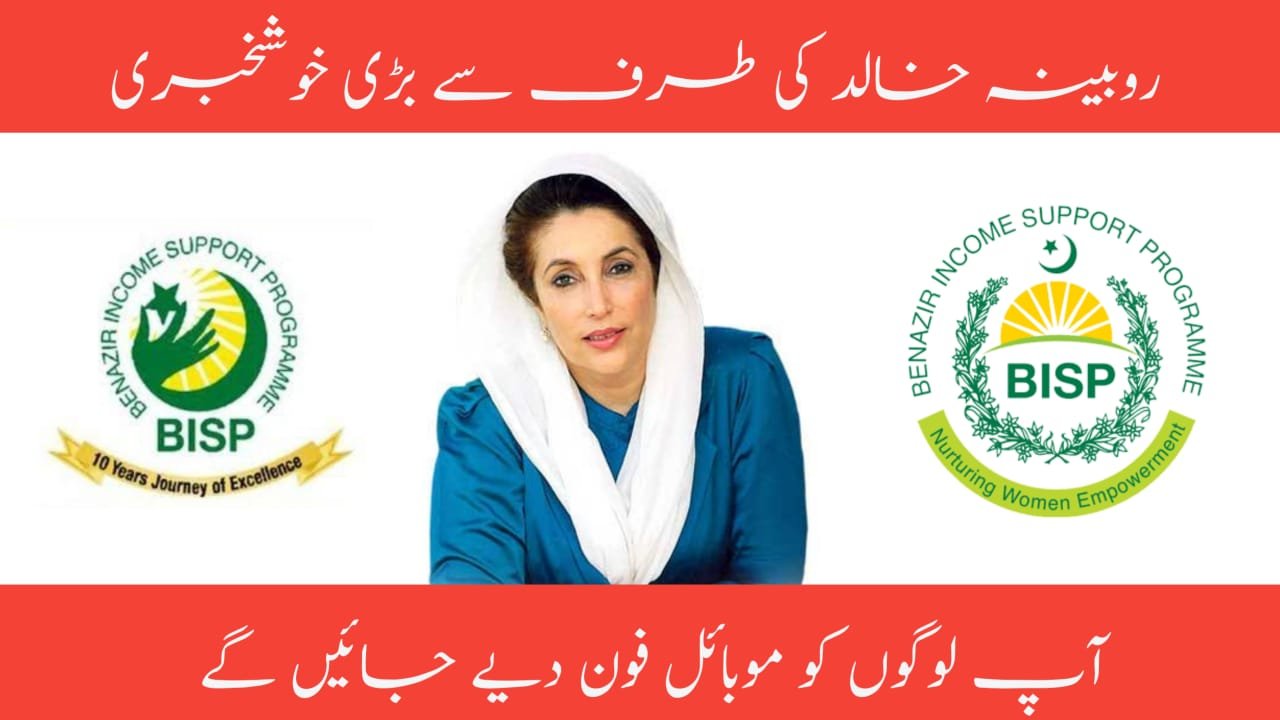Rubina Khalid Announced Mobile Phone Distribution Through BISP. If you are a participant in the Benazir Income Support Program and receive financial assistance through it, there is some exciting news for you. Rubina Khalid, the Chairperson of BISP, has announced a new initiative to distribute mobile phones to BISP beneficiaries. This initiative is particularly significant for those who have registered with the program. If you have not yet registered, it is advisable to do so as soon as possible. The goal of this project is to provide convenience and support to those involved in the BISP program. Rubina Khalid Announced Mobile Phone Distribution Through BISP.
Rubina Khalid’s New Program Announcement
Rubina Khalid’s new program is part of a broader effort by the Government of Pakistan, including the Government of Punjab, to provide essential facilities to the underprivileged. This initiative is particularly beneficial for the poor, as many people in Pakistan still lack access to basic communication tools like mobile phones. In today’s world, having a mobile phone is essential not only for personal communication but also for staying informed about important news and updates, whether they are related to personal matters or broader community events.
Many of the beneficiaries of the BISP program, who receive financial assistance, do not have access to mobile phones. Recognizing this gap, Rubina Khalid has decided to provide these individuals with mobile phones. If you are interested in receiving a mobile phone, it is important to complete your registration process with BISP as soon as possible to be eligible for this benefit.
Purpose of Distributing Mobile Phones
Rubina Khalid’s decision to distribute mobile phones is driven by the desire to provide a crucial facility to the poor population of Pakistan. In today’s digital age, mobile phones are not just a luxury but a necessity. They enable people to stay connected with their families and communities, access important information, and even seek help in emergencies. Unfortunately, due to financial constraints, many people in Pakistan are unable to afford mobile phones, which puts them at a significant disadvantage.
This initiative acknowledges the reality that many poor people in Pakistan have been so severely impacted by poverty that they cannot afford even basic necessities like mobile phones. Rubina Khalid’s announcement is a direct response to this issue, aiming to bridge the communication gap by providing mobile phones to those who need them most.
Eligibility Criteria for Receiving Mobile Phones
To ensure that the mobile phones are distributed to those who genuinely need them, Rubina Khalid has outlined specific eligibility criteria. The primary focus is on individuals who are actively involved in the BISP program. Here are the key eligibility requirements:
- BISP Program Workers: Individuals who work within the BISP program and are involved in the distribution of financial assistance to the poor are eligible to receive mobile phones. This ensures that those who are on the front lines of supporting the poor have the necessary tools to perform their duties efficiently.
- Participants in the NSER Survey: Those who have participated in the National Socio-Economic Registry (NSER) survey, which helps identify households eligible for social safety net programs, are also eligible. The NSER survey is a critical component of identifying and supporting the most vulnerable segments of society.
- Previous Participants in the BISP Program: Individuals who have been part of the BISP program in the past and continue to meet the eligibility criteria can also receive mobile phones. This ensures that long-term beneficiaries of the program are not left out of this new initiative.
By adhering to these eligibility criteria, the program aims to prioritize those who are most in need and who will benefit the most from receiving a mobile phone.
How to Register for the Mobile Phone Distribution Program
If you are interested in receiving a mobile phone through this initiative, it is important to understand the registration process. The mobile phones provided by BISP will only be given to those who are already registered with the program. Therefore, if you are a new participant or have not yet registered, you should complete the registration process as soon as possible.
Here are the steps you should follow:
- Ensure You Are Registered with BISP: The first step is to confirm your registration with the BISP program. This is essential because only those who are officially part of the program will be eligible to receive a mobile phone.
- Verify Your Eligibility: Make sure that you meet the eligibility criteria outlined above. This includes being an active participant in the BISP program, having taken part in the NSER survey, or being a previous participant in the program.
- Complete Any Required Documentation: If there are any additional forms or documents required for the mobile phone distribution program, make sure to complete and submit them promptly. This will help ensure that your registration is processed smoothly.
By following these steps, you can increase your chances of receiving a mobile phone through this important initiative.
The Impact of Mobile Phones on the Lives of the Poor
Rubina Khalid’s decision to distribute mobile phones to the poor is expected to have a profound impact on their lives. For many people, especially those living in poverty, having access to a mobile phone can be a game-changer. It provides them with a means of communication that is vital for both personal and professional reasons.
One of the key benefits of this initiative is that it allows poor people to stay connected with their families and communities, even if they are living in remote areas. In situations of joy or sorrow, such as weddings, funerals, or other important events, having a mobile phone ensures that people can stay in touch with their loved ones.
Moreover, mobile phones can also serve as a tool for economic empowerment. With access to a mobile phone, individuals can explore new opportunities, such as small business ventures, accessing financial services, and receiving important updates on government programs. This can help lift people out of poverty and improve their overall quality of life.
Challenges Faced by the Poor Without Mobile Phones
The lack of access to mobile phones poses significant challenges for the poor in Pakistan. In today’s world, where much of communication and information exchange happens digitally, not having a mobile phone can leave people isolated and disadvantaged. This is especially true for those who are already struggling with poverty and do not have the financial means to purchase a phone.
Without a mobile phone, poor individuals may find it difficult to stay informed about important developments in their community or to seek help in times of need. For example, if there is an emergency, such as a medical issue or a natural disaster, those without mobile phones may not be able to reach out for assistance. This can lead to further hardships and exacerbate their already difficult circumstances.
Additionally, the COVID-19 pandemic has highlighted the importance of digital connectivity. With lockdowns and restrictions on movement, many services and communications have moved online. Those without access to mobile phones or the internet have been left out, unable to participate fully in society or access essential services.
Conclusion: A Step Towards Empowerment
Rubina Khalid’s initiative to distribute mobile phones to the poor is a significant step towards empowering the most vulnerable segments of society. By providing them with the tools they need to stay connected, this program addresses a critical gap and helps ensure that no one is left behind in the digital age.
This initiative is not just about giving out mobile phones; it is about providing a lifeline to those who need it most. It is about ensuring that the poor have the means to stay in touch with their loved ones, access vital information, and seek help when needed. It is about giving them the tools they need to improve their lives and take advantage of new opportunities.
As the distribution of mobile phones begins, it is crucial that the program is implemented efficiently and fairly. The government must ensure that the phones reach those who need them most and that the process is transparent and accountable. With the right support and resources, this initiative has the potential to make a lasting difference in the lives of thousands of poor individuals across Pakistan.
In conclusion, Rubina Khalid’s mobile phone distribution initiative is a welcome development that promises to bring positive change to the lives of the poor. By addressing the communication needs of the most vulnerable, this program helps pave the way for a more inclusive and equitable society. As the program unfolds, it will be important to monitor its impact and continue to find ways to support the poor in their journey towards a better future.

